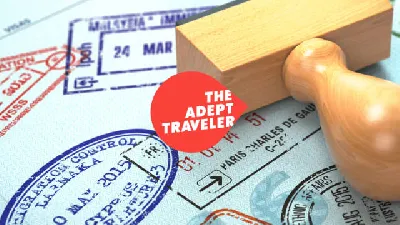Tourist Visa
In the increasingly globalized world, the allure of international travel is growing exponentially. Among the key elements that facilitate such adventures is the elusive tourist visa, an essential document that allows travelers to explore foreign lands legally. Whether you are planning a leisurely vacation, visiting family and friends, or simply seeking new experiences, understanding the intricate details of a tourist visa is paramount.
Understanding the Basics
A tourist visa is a type of non-immigrant visa issued by a country allowing visitors to enter and stay for a designated period, primarily for tourist activities such as sightseeing, recreational activities, and visits. It's distinct from other visas like business, student, or work visas, as it does not permit the holder to engage in gainful employment or long-term studies.
Application Process
The application process for a tourist visa can vary widely depending on the country you're planning to visit. Generally, the procedure includes filling out an application form, paying a non-refundable fee, providing biometric data, and attending an in-person interview at a consulate or embassy.
- Filling Out the Form: The visa application form usually requires personal details, travel plans, and sometimes specific questions related to your travel purpose. It's crucial to provide accurate and honest information.
- Fees: Visa fees vary and are often non-refundable, so it's wise to ensure that you're fully prepared before submitting your application. Some countries might also have additional service charges.
- Biometric Data: As part of strengthening security measures, many countries require applicants to provide fingerprints and a recent photograph. This biometric data helps in maintaining the authenticity of the traveler.
- Visa Interview: The consular officer will ask questions to determine the legitimacy of your visit. They might inquire about your travel itinerary, financial stability, and ties to your home country to ensure you intend to return after your trip.
Required Documentation
Different countries might ask for various documents, but some of the common requirements include:
- Valid Passport: Your passport must be valid for at least six months beyond your intended stay.
- Photographs: Generally, passport-sized photos taken within the last six months.
- Travel Itinerary: Proof of onward and return travel plans.
- Financial Proof: Bank statements, pay stubs, or other financial documents that demonstrate your ability to support yourself during your stay.
- Invitation Letter: If visiting family or friends, an invitation letter from your host can be beneficial.
- Employment Details:** Proof of employment or an employment leave letter can help establish ties to your home country.
Duration and Limitations
Tourist visas are typically issued for short stays, commonly ranging from 30 to 90 days. However, the actual length of stay permitted, the number of entries allowed (single, double, or multiple entries), and the visa's validity period can significantly differ depending on the issuing country and its relationship with your home country.
Overstaying Risks: It's crucial to adhere to the permitted duration of stay. Overstaying a tourist visa can lead to fines, detention, deportation, and even being barred from entering that country in the future.
Visa Waiver Programs
Some travelers might not require a tourist visa thanks to bilateral or multilateral agreements between countries. Visa waiver programs allow citizens from participating countries to travel to certain destinations without obtaining a visa, typically for short stays.
For example, the United States Visa Waiver Program (VWP) permits citizens from 39 countries to travel to the U.S. for tourism or business stays of up to 90 days without a visa. However, travelers must first obtain an Electronic System for Travel Authorization (ESTA).
Special Considerations
- Health Insurance: Some countries require proof of travel health insurance that covers not only medical emergencies but also Covid-19 related treatment.
- Covid-19 Protocols: Many nations have updated their entry requirements due to the global pandemic, such as mandatory quarantine periods, negative test results, or proof of vaccination.
- Local Laws and Customs: Being aware of the host country's laws and customs can prevent potential legal issues and enhance your travel experience.
Challenges and Tips
Acquiring a tourist visa can sometimes be fraught with obstacles, from lengthy processing times to potential rejections. Here are some tips to enhance your chances of a successful application:
- Early Application: Start the visa application process well ahead of your planned travel date to accommodate any delays.
- Complete Documentation: Ensuring that all your paperwork is thoroughly completed and accurate can prevent unnecessary hassles.
- Clear Travel Purpose: Clearly articulate your travel intentions during both your application and interview to demonstrate genuine tourist intent.
- Professional Advice: When in doubt, seek the expertise of a visa consultant or immigration lawyer, especially for countries with complex visa procedures.
Future Perspectives
With advances in digital technology, the world of tourist visas is also evolving. Many countries are moving towards e-visa systems, which allow tourists to apply for and receive visas online, streamlining the application process. The **Schengen Area** offers electronic visa applications for travelers wishing to visit multiple European countries under a single visa.
Post-pandemic recovery may also introduce more stringent health checks and requirements; conversely, some nations might adopt more lenient protocols to boost tourism sectors adversely affected by global travel restrictions.
While obtaining a tourist visa can sometimes seem like a daunting task, possessing thorough knowledge of the application process, required documentation, and staying updated with current travel policies can ease the journey. Whether it’s exploring the pyramids of Egypt, experiencing the romance of Paris, or diving into the rich cultural tapestry of Japan, a well-prepared tourist visa application is your passport to new horizons.
UK ETA Now Mandatory for U.S. Travelers in 2026

Armenia Visa Exemption For Residents Through July 1

ESTA Social Media Data US, Senators Push Back

China Visa Free Entry for Canada, UK Travelers 2026

U.S. Immigrant Visa Pause, 75 Countries, Starts Jan 21

UK ETA Enforcement Feb 2026, Avoid Denied Boarding

Bolivia Visa Free Entry For US And Israeli Tourists

Asia Advisories And UAE Visit Visa Extensions
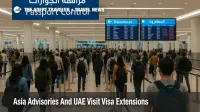
Hainan Tourism Rules Expand Visa Free Entry, Duty Free

Cyprus Schengen Entry 2026 To End Long Stay Resets

Australia Visa Systems Outage November 28 To 29
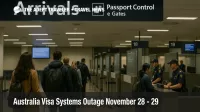
Thailand Visa Run Limit Hits Long Stay Tourists
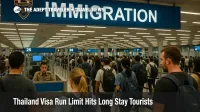
Brazil Visa Waiver Bill For US, Canada, Australia Tourists
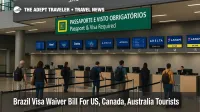
Israel Entry Requirements For Tourists In 2026
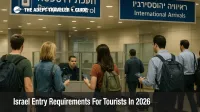
Australia Entry Requirements For Tourists 2025 2026
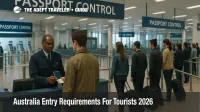
Visa Requirements for U.S. Travelers: A Global Guide
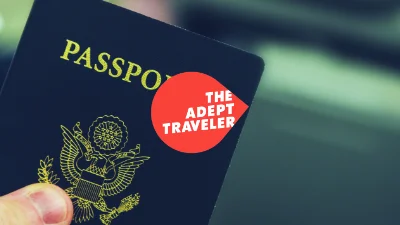
Understanding Travel Visas: A U.S. Traveler's Guide
